If you’re still on the fence about I Declare War, may I point you towards the first four minutes of the film? They’re a pretty accurate reflection of the film’s overall tone, even if the film definitely opens up in scale as it moves along…
Now that you’re convinced, or have already seen the film on VOD, or are planning on catching it in theaters starting today, let me share with you my chat with filmmakers Jason Lapeyre, Robert Wilson and their star, Gage Munroe.
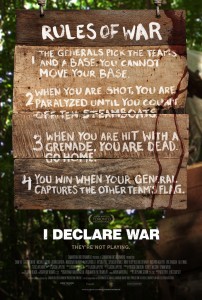 I Declare War was a ten year passion project for Jason Lapeyre, who wrote the script in 2002. Ultimately he teemed up with Robert Wilson to make the film, creating a pretty unique Writer-Direct, Producer-Direction team. The result is a rather unique movie, which I loved at Fantastic Fest and can’t wait for more people to see. Gage Munroe plays the kid in the film with the most strategic acumen and overall dedication to “War,” to the point of being too ruthless and cold about his real-life friendships. It’s one of many surprisingly rich performances from the all-kids cast, smartly guided by the co-directors.
I Declare War was a ten year passion project for Jason Lapeyre, who wrote the script in 2002. Ultimately he teemed up with Robert Wilson to make the film, creating a pretty unique Writer-Direct, Producer-Direction team. The result is a rather unique movie, which I loved at Fantastic Fest and can’t wait for more people to see. Gage Munroe plays the kid in the film with the most strategic acumen and overall dedication to “War,” to the point of being too ruthless and cold about his real-life friendships. It’s one of many surprisingly rich performances from the all-kids cast, smartly guided by the co-directors.
My chat with these three covers a lot of interesting ground from the inherent courting of controversy the film’s premise presents, to this world of pre-theatrical VOD release, through the craft a pre-teen can bring to an acting performance. I hope you enjoy reading it as much as I enjoyed being a part of it…
————
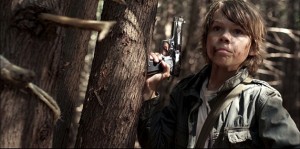 CHUD: Mr. Munroe! Tell me a little bit about your perspective on the craft of acting, and what you’ve learned from your already rich career of working in projects of all scales…
CHUD: Mr. Munroe! Tell me a little bit about your perspective on the craft of acting, and what you’ve learned from your already rich career of working in projects of all scales…
Gage Munroe: I think even if you’ve been acting for – I don’t know – going on twenty years, you can still learn things from other people. There’s always something to learn from your cast mates, from filmmakers, and I think going on to set for I Declare War was awesome, because I got to have a lot of fun on camera and off camera, which is really nice. I got to — you know, I got to bond with the cast really well. We still hang out every once in a while, and think that was something that’s really, really valuable.
CHUD: Did you notice a difference in how you and other cast members would approach your job, as it were? Did people have distinctly different styles?
Gage Munroe: I think everyone was pretty quick about getting in character and shooting scenes. We were on — we tried to move along as quickly as possible. Of course there are a few intense scenes, where I guess some people needed some extra preparation, but other than that, it was pretty straightforward.
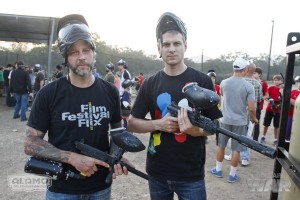 CHUD: As for our Directors, was the rehearsal process like for this film? Was there one or was it all kind of on-set?
CHUD: As for our Directors, was the rehearsal process like for this film? Was there one or was it all kind of on-set?
Jason Lapeyre: No, we avoided rehearsal because we wanted to maintain like a real spontaneity to what happened, although we did have this really fantastic table read in pre-production, where it became very apparent to us that there was total chemistry between different kids.
Robert Wilson: Potential chemistry.
Jason Lapeyre: Yeah. It was a very exciting moment for us to actually hear the script being read out loud. I realized it did, in fact, work.
Robert Wilson: We tried to do it again and get our boot camp day. Had another read and it just kind of wasn’t the same thing, so we moved away really quickly from even thinking about rehearsing at that point, because we just didn’t want to step all over it.
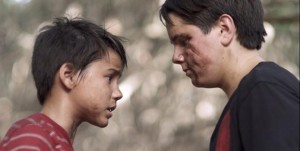 CHUD: Did that first table read identify any challenges for you guys that you anticipated in production or anything that, for you, that you felt like you needed to prepare for in terms of how to manage these kids and get the best out of them?
CHUD: Did that first table read identify any challenges for you guys that you anticipated in production or anything that, for you, that you felt like you needed to prepare for in terms of how to manage these kids and get the best out of them?
Jason Lapeyre: No, I think the big takeaway was: “Wow, this might actually work,” because at that point it was such an insane idea that we were worried about the actual, you know, validity of it.
Robert Wilson: We knew that we had twelve really buoyant personalities that, you know, we weren’t always going to be able to service in terms of questions that we sort of structured our off-camera production such that they always had somebody with them, who not only could answer questions that we might not be able to get to, but could spy on them for us and bring us–
Gage Munroe: Intel.
Robert Wilson: –intel.
Gage Munroe: The child wrangler!
Jason Lapeyre: Yeah, the child wrangler.
Robert Wilson: That’s what she dubbed herself. She was the– You know, but we also wanted it to be fun. We didn’t want the experience to be brought down by having a question and not being able to answer it for you when you wanted an answer. So, you know, we made sure that that was in place, and it also made the parents able to comfortably not explore the idea of being a really effective stage mom or dad. They could drop the kids and enjoy themselves, knowing that we weren’t going to, you know, scar them.
CHUD: I’m sure that was an interesting challenge – comforting the parents.
Robert Wilson: The parents were awesome. One and all, they’re all awesome. We mean the ‘thank you’ at the end. They were receptive of their offspring’s way and let them succeed.
Jason Lapeyre: Yeah, they got it. I mean they knew we weren’t trying to exploit their kids; that we were just trying to tell an honest story about what it’s like to be that age.
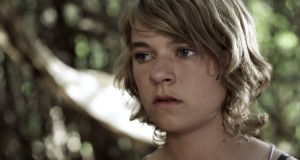 CHUD: Do you feel like that was true from the very moment you were putting scripts in people’s hands, or did it take any amount of kind of pitching and convincing or assurances?
CHUD: Do you feel like that was true from the very moment you were putting scripts in people’s hands, or did it take any amount of kind of pitching and convincing or assurances?
Jason Lapeyre: No. Anyone who’s freaked out by the script just didn’t have their kid audition.
Gage Munroe: It was pretty apparent right when you read, like even the sides almost. Some of the bits and sides that it was geared towards just a naturalistic way of portraying, you know, twelve/thirteen-year-old kids.
CHUD: The film does walk this kind of razor’s edge, even without all the context of social events of late. The tone of it is really well maintained, and I feel like that comes from like an internal consistency that the movie follows its own rules and it’s very earnest about when it needs to be real, when it needs to be violent, when it needs to be not, and it’s always serving the story and the kids. So, tell me about, for you guys writing it, did you have rules that you set in place and guidelines to follow, or did it just kind of flow naturally?
Jason Lapeyre: I wrote the film and when I wrote the script, yeah, there was this very conscious decision to make it happen in a hermetically sealed world, where there were not going to be any adults and to have it take place through the imagination’s of the kids. Now, when it came to actually sitting down and making – directing – the film with Rob, we did go scene by scene and make a conscious choice about what was going to be sticks and what was going to be guns, and what about the context of the scene made that appropriate. So, those were all choices.
 CHUD: I’m trying to recall from maybe a conversation we had at Fantastic Fest- were there instances where you guys would shoot a scene, say, with real guns and then with stick guns to allow yourself options later, or did you always know exactly how you wanted it on set?
CHUD: I’m trying to recall from maybe a conversation we had at Fantastic Fest- were there instances where you guys would shoot a scene, say, with real guns and then with stick guns to allow yourself options later, or did you always know exactly how you wanted it on set?
Jason Lapeyre: No, the instances where we did that was, you know, for some of the opening scenes. Like when the transition happened, you didn’t know what shot it was going to be. But pretty much we found a rhythm to when we felt the actors should be suffering adolescent reality and when we felt like they’d have their machine guns, because somebody could still be playing the game. Now, we still had to field, “can we have guns for this scene?” Because nobody wants the sticks when they have guns, right?
CHUD: Of course!
Gage Munroe: Yeah, there we a few moments where, like in between shots, it’ll change. Like at the opening.
CHUD: When you were preparing to act in a scene, did you have kind of a ‘guns versus sticks’ moment where you were deciding whether you were still in the game or outside of it, or did you just kind of — tell me a little bit about that process.
Gage Munroe: I think, especially for the character of PK. Like it even when maybe the other characters are out of it. He’s probably still in the moment, in the war. Like it’s not — he’s not in for war until the game is over. So, It was almost always the big prop gun.
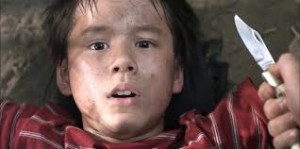 CHUD: Have you guys had to deal with any kind of aggressively offended people since this film started gaining traction?
CHUD: Have you guys had to deal with any kind of aggressively offended people since this film started gaining traction?
Robert Wilson: Shockingly no.
Jason Lapeyre: Yeah, we keep anticipating it, but it has failed to materialize and I think that’s because anyone who’s actually seen the film very quickly realizes that it’s not about guns. It’s about childhood.
Robert Wilson: You get a couple quick comments on the trailer.
Jason Lapeyre: Yeah. If you have only seen the trailer, you might freak out a little.
Robert Wilson: But they get jumped on really fast by anybody who’s seen the movie. And nobody actually seems to want to have a debate. They just want to say, “It’s irresponsible to put kids with guns in their hands. These guys are fucking assholes,” and then it ends. There’s a really nice actually long debate on sort of a gun club forum.
Jason Lapeyre: Oh yeah, yeah.
CHUD: Interesting…
Robert Wilson: Where they’ve actually accused us of attempting to make something to further the argument of amending the right to have guns.
Jason Lapeyre: They think it’s anti-gun propaganda.
Robert Wilson: Yeah. So it’s bizarre. And you know, I mean like we didn’t think about this, making it. We just jumped off a train, suddenly we had this thing where you might not be able to sell it or at least you weren’t going to get anything under an R, which kind of hampered and limited your audience. So, we worried about it and it just hasn’t, you know, yeah.
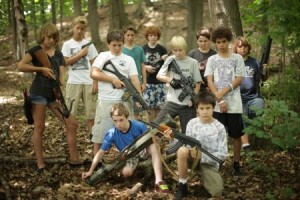 CHUD: I think what I’ve noticed, and I mean from my personal experience – I had Pine Cone Wars that kind of eerily resemble this film in woods that are very similar. And I think a lot of people have liked that, and that has manifested in people making shorts that are similar to this. I think it’s one of those ideas that everybody is like: “Why didn’t I think about that, and then do it brilliantly like these guys did.” How much of that were you–
CHUD: I think what I’ve noticed, and I mean from my personal experience – I had Pine Cone Wars that kind of eerily resemble this film in woods that are very similar. And I think a lot of people have liked that, and that has manifested in people making shorts that are similar to this. I think it’s one of those ideas that everybody is like: “Why didn’t I think about that, and then do it brilliantly like these guys did.” How much of that were you–
Robert Wilson: We’ll sell the rights. Give us a call. We’ll work on that remake.
CHUD: So, how cognizant were you of anything else out there that might’ve touched on this idea in less substantial way?
Jason Lapeyre: Because I wrote the script in 2002, like I was aware that it was a pretty hot idea, at the risk of sound egotistical, and I was so scared that someone was going to make it before we got a chance to make it.
Robert Wilson: I actually read the script and thought: “This is a fucking hot idea. Why has no one thought about this? We have to make this.”
Jason Lapeyre: Yeah, we have to hurry. But fortunately, we managed to get through it without anyone making a similar film, except right when we were finishing our cut of the film, The Hunger Games. Now, fortunately, The Hunger Games is very different, you know, totally and content-wise, but it still does have this core device of like young people hunting each other. And there is one scene, by sheer coincidence, in the film that’s really similar to a scene in I Declare War. But other than that, there hasn’t been- Some people accuse us. Like I’ve seen accusations of like having emulated a music video here or commercial over there. The film was actually made before most of that stuff came out.
CHUD: For our actor, you’ve been in big scale projects. You’ve been in smaller stuff that you’ve led obviously. You’ve kind of run the gamut already in terms of scales of projects. So, what are your personal ambitions as you move forward as an actor?
Gage Munroe: I mean if I can continue acting, I will. Luckily I’ve been relatively full with work. You know, if I come up with some crazy idea, maybe make something up and be behind the scenes. But we’ll see. I don’t know.
Jason Lapeyre: Make something as a writer or a director, or both?
Greg Munroe : Writing or directing.
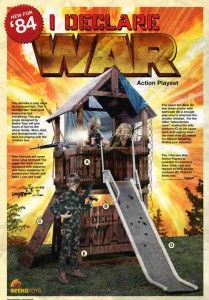 CHUD: It’s worked for Ben Affleck as of late! Before I lose everyone, I want to get you to talk a little bit about the co-directing thing and what you learned from that, and what you might take from that when you do individual projects again. You know, as lone wolfs, what you learned about yourself…
CHUD: It’s worked for Ben Affleck as of late! Before I lose everyone, I want to get you to talk a little bit about the co-directing thing and what you learned from that, and what you might take from that when you do individual projects again. You know, as lone wolfs, what you learned about yourself…
Robert Wilson: Well, for me, because as a directing-producer versus a directing-writer, it’s easy to win a lot of arguments. So, that was good. I learned that’s the side of the fence that you want to be on. I think primarily – I was thinking about this earlier – was that you learn a new respect for how context of the character influences the meaning of a scene. When someone else is worried about the dialogue and that sort of stuff, they imagine it, and you’re able to sit back and just go: “Hold on a second, I can just watch the screen and fix this, and make this better. Bring something to it,” which is something that I don’t think you have the luxury of doing when you’re playing auteur writer/director. Not at all. I think the world is moving a little fast for doing that – that aspect. So, I think I learned that as much as I love writing stuff, I may be actually more effective directing other people’s written stuff. And it’s kind of nice to take that off the plate with something you have to do. Like: “That’s it. I’m writing right now.”
Jason Lapeyre: Yes, it was a painful, and yet very valuable lesson to — and it was particularly because I had written the script ten years earlier and had the movie in my head for ten years. It was very difficult for me to liberate myself from the script and to have Rob come in. And at the time, it felt ruthless. He would come in and say, “You know, there might be a better idea than what’s on the page.” And you know, having the benefit of hindsight now, it’s obvious that it worked better than what was on the page, but in the moment, it was so hard to let go of that ten-year-old fidelity. So, that was definitely a great lesson as a director; was not to treat the script like a Bible. You know what I mean?
CHUD: Is there anything that kind of fundamentally — I know I’m sure a million little details changed from your very first draft to what we see in the movie. Is there anything that kind of fundamentally, at the core of the script, changed in any way?
Jason Lapeyre: No, because I think that’s what everybody was responding positively to. That there were no radical, gory changes.
Robert Wilson: No, there was a rapid change from prep movie to the floor movie. The discussions of what the similar movies out there in the world are going to be like are incredibly different. And we did not go remake City of God. But I mean I think that’s a process that was interesting to watch, but it happened in front of you because the script never was City of God, and yet, strangely, the DP and Jason were able to have this City of God conversation. But it’s weird to get two sides of the fence. Start with a movie in mind they set out make and have to realize the movie they’re making on the floor, and I think it actually served in this case, because it couldn’t — you couldn’t fight for something that wasn’t really happening in front of you, that was in your imagination, as you saw your career blossom. Does that make sense? Yeah, because I mean we were doing it too, right? We wanted a certain thing and then, you know. Anyway. Does that make any sense, Renn?
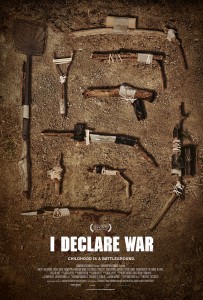 CHUD: That makes all the sense in the world.
CHUD: That makes all the sense in the world.
[The lovely PR rep calls time here.]
CHUD: Let me just throw one more question out, because I do like to ask guys who have made these wonderful Indie films that get picked up… We’re kind of in an interesting transitional time between theatrical windows and VOD, and like VOD coming first and theatrical later, and it’s all — you know, people are still figuring it out. You guys had the good fortune, from my perspective, to wind up with a pretty good operation over there with the Drafthouse folks. But in general, what’s your view on how this window for Indie films is changing and what it’s like to put a movie out in this environment right now?
Robert Wilson: It’s terrifying. With Drafthouse specifically, I don’t think there’s a better fit for us, given the fact that we didn’t think about making a marketable movie. We didn’t even think about making a movie that was going to be peachy, so we had the chance of getting more tickets. I mean we did some dumb stuff. We hopped on the train and just went: “This is what it was like to be thirteen, so this is what we’re making.” I don’t think we’re yet sure if Drafthouse hopped on that train faster they wanted to too. But we know, when we entered into conversation with them, they’ve already gotten their groundwork envisioned. They’ve already got their plan that involves, you know, actively making — supporting something they love and continuing making it better. So, for us, that’s great. Do I recommend doing it as a business model as a producer for Indie films? Brutal. It’s hard.
Jason Lapeyre: Yeah, this whole world is still trying to figure out, you know, what to do now, and what would we love about Drafthouse is they are not sitting back and copying what other people are doing. They’re thinking it out and they’re taking chances, and they’re building their brand based on movies they love, and then trying to figure out how to navigate these totally unknown waters.